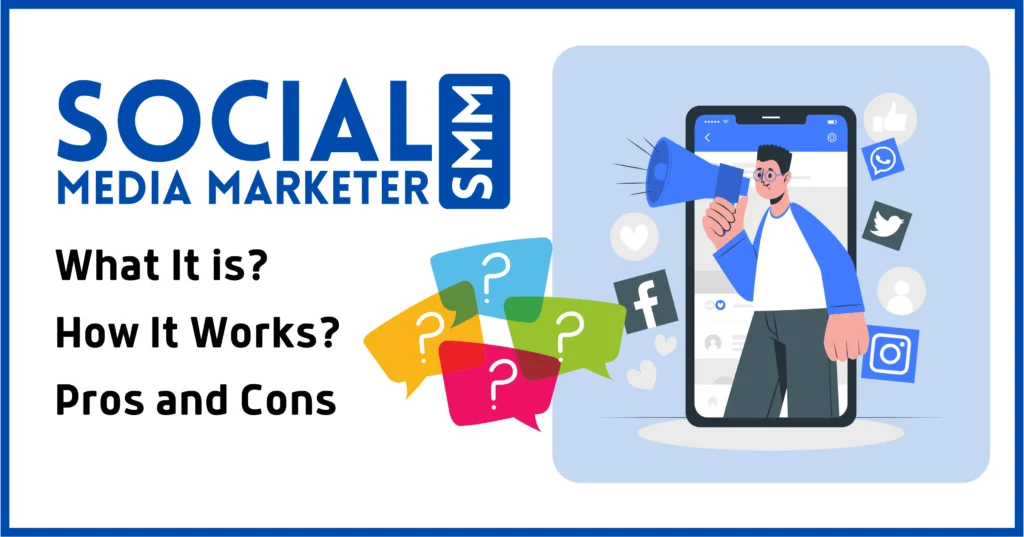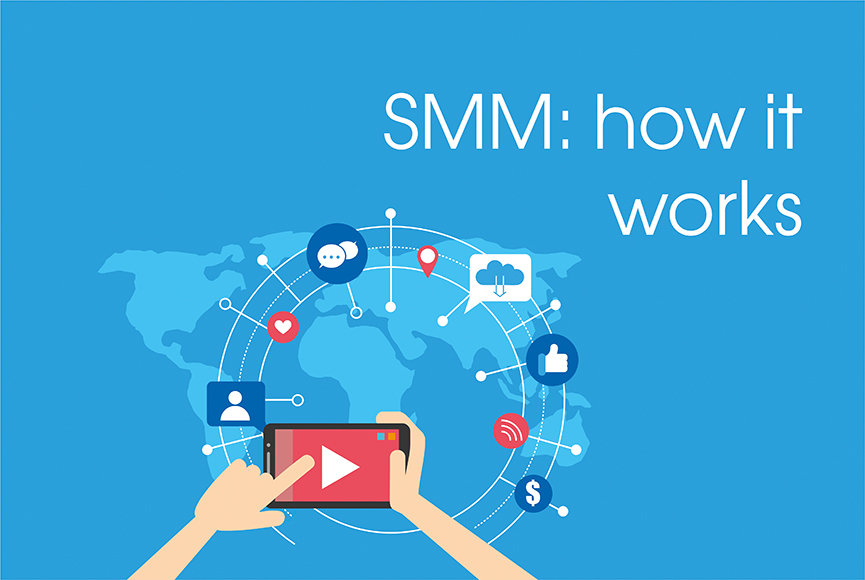In the dynamic landscape of digital marketing, Social Media Marketing (SMM) has emerged as a powerhouse strategy. Leveraging the influence of social media platforms to connect with audiences, build brand identity, and drive business growth, SMM has revolutionized the way companies engage with their customers.
This article delves into the core aspects of SMM, providing insights into its workings, its tremendous potency, and the pros and cons that come with it.
Social Media Marketing (SMM): What It Is, How It Works

Social Media Marketing (SMM) involves the strategic use of various social media platforms to promote products, services, or content. Through engaging posts, captivating visuals, and interactive content, businesses can create a strong online presence and foster meaningful connections with their target audience.
The power of SMM lies in its ability to tap into the vast user base of platforms like Facebook, Instagram, Twitter, and LinkedIn, allowing brands to showcase their offerings and engage with potential customers on a personal level.
Why Is Social Media Marketing (SMM) So Powerful?

SMM wields immense power due to its unique blend of reach, engagement, and targeting capabilities. Here’s why it’s so impactful:
Unparalleled Reach
Social media platforms boast billions of users worldwide, presenting an unparalleled opportunity to connect with a diverse and extensive audience.
Precise Audience Targeting
SMM platforms offer advanced targeting options, enabling businesses to reach their ideal customers based on demographics, interests, and behaviors.
Engagement and Interaction
SMM encourages direct interactions between brands and consumers, fostering authentic relationships and building brand loyalty.
Visual Appeal
Visual content dominates social media, allowing brands to convey their messages quickly and memorably through images and videos.
Data-Driven Insights
SMM provides valuable insights into user engagement, preferences, and behaviors, helping businesses refine their strategies for optimal results.
How Social Media Marketing (SMM) Works

SMM operates through a strategic process that involves several key steps:
Setting Clear Goals
The foundation of any successful SMM campaign is defining clear objectives, whether it’s brand awareness, lead generation, or sales conversion.
Choosing the Right Platforms
Different platforms cater to diverse audiences. Selecting the right ones ensures targeted outreach.
Content Creation
Engaging and relevant content creation is crucial. Posts, visuals, and videos should align with the brand’s voice and resonate with the audience.
4Scheduling and Posting
Posting consistently and at optimal times maintains audience engagement and maximizes visibility.
Engagement and Interaction
Responding promptly to comments, messages, and user-generated content fosters a sense of community and trust.
Analyzing and Optimizing
Regularly assessing performance metrics helps refine strategies for better outcomes.
Advantages of Social Media Marketing (SMM)

Global Reach
SMM transcends geographical boundaries, enabling businesses to reach a global audience.
Cost-Effectiveness
Compared to traditional marketing, SMM offers a cost-effective way to promote products and services.
Audience Insights
Through data analytics, SMM provides valuable insights into customer behavior and preferences.
Brand Building
Consistent SMM efforts enhance brand visibility and recognition.
Direct Communication
Brands can directly engage with customers, resolving queries and building trust.
Diverse Content Formats
SMM supports various content formats, from videos to infographics, catering to diverse audience preferences.
Disadvantages of Social Media Marketing (SMM)

Time-Consuming
Effective SMM requires dedicated time and effort to create and manage content.
Algorithm Changes
Platform algorithm changes can impact reach and engagement.
Negative Feedback
Negative comments or feedback can spread quickly, necessitating prompt and careful responses.
Resource Intensive
Managing multiple social media platforms demands resources and expertise.
Competition
The saturated SMM landscape makes standing out a challenge, requiring innovative strategies.
Measuring ROI
Gauging the exact return on investment from SMM can be complex.
Examples of Social Media Marketing Strategies
1. Content Calendar: Plan and schedule posts in advance to maintain consistency and align content with marketing goals.
2. Influencer Partnerships: Collaborate with influencers to tap into their established follower base and increase brand visibility.
3. User-Generated Content Campaigns: Encourage customers to create content featuring your products, fostering a sense of community and authenticity.
4. Paid Advertising: Utilize targeted paid ads to reach specific demographics and increase conversion rates.
5. Engagement Campaigns: Run contests, polls, or challenges to encourage audience participation and interaction.
6. Live Streaming: Host live sessions to showcase products, conduct Q&A sessions, and connect with your audience in real-time.
Conclusion
Social Media Marketing (SMM) is a game-changing strategy that empowers businesses to connect with their audience, drive growth, and cultivate lasting relationships. Its power lies in the combination of global reach, targeted engagement, and valuable insights.
By understanding its mechanisms, harnessing its advantages, and navigating its challenges, businesses can harness the full potential of SMM to achieve their goals.
Related Reading:
- Best Social Media Marketing Agency in Pakistan
- How is Social Media Marketing Effective?
- Launching a Brand on Social Media in Pakistan
- Best Social Media Marketing Services
- Mastering Social Media Management Services in Pakistan
- Promoting Small Business on Social Media
FAQs
Q: Can SMM work for any type of business?
Absolutely! SMM’s versatility makes it suitable for a wide range of businesses, from small startups to large corporations.
Q: What’s the key to creating engaging content?
Understanding your target audience’s preferences and pain points is crucial. Tailor your content to resonate with their needs.
Q: Is there an optimal posting frequency?
The ideal posting frequency varies based on the platform and audience. Experimentation and tracking engagement metrics can help determine the sweet spot.
Q: How can I handle negative comments or reviews?
Address negative feedback professionally and promptly. Respond privately if possible and aim to resolve the issue to the customer’s satisfaction.
Q: Which metrics should I track to measure SMM success?
Key metrics include engagement rate, reach, click-through rate, and conversion rate. These metrics offer insights into the effectiveness of your campaigns.
Q: Are paid ads necessary for SMM success?
While organic content can yield results, paid ads can amplify your reach and target specific demographics more effectively.



